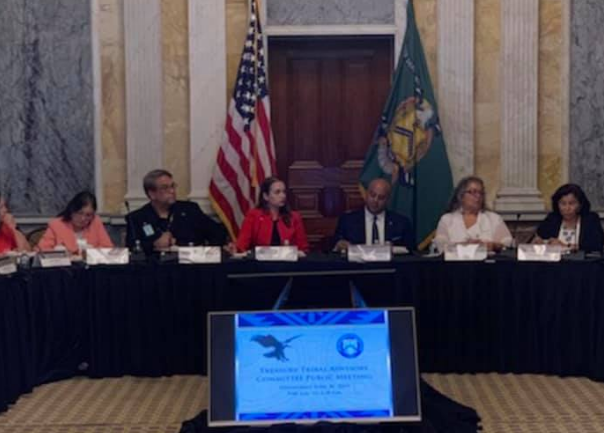
- Details
- By Native News Online Staff
WASHINGTON — While the pandemic has thwarted face-to-face meetings in regards to federal agencies, the Treasury Tribal Advisory Committee (TTAC) met virtually for its quarterly meeting Wednesday, Sept. 16, 2020, to continue its mission to provide recommendations to the Department of Treasury.
The TTAC is an independent advisory committee that directly advises the Secretary of Treasury on significant matters relating to the taxation of American Indians, the training of Internal Revenue Service field agents, and the provisions of training and technical assistance to Native American financial officers.
More than 100 people watched the online meeting as the TTAC, Treasury and IRS staff were joined by tribal representatives throughout Indian Country. Viewers heard various TTAC subcommittee reports focused on the overall components of the General Welfare Exclusion Act (GWEA), dual taxation and tribal pension programs. This also provided a forum for tribal leaders to advocate and express policy recommendations that directly affect the Treasury Dept.
TTAC Chairwoman Lacey Horn (Cherokee Nation) thanked the participants and said she appreciated the issues and solutions that were outlined.
Wednesday’s meeting demonstrated that the TTAC has continued to work hard to develop a clearinghouse to support programs that benefit the general welfare of tribes.
Implementation of general welfare programs by tribes using the framework identified by the GWEA have varied but allow these benefits to support the general welfare of tribal citizens.
“Whereas, this does not replace tribal consultation, it enhances the platform to support tribes to exercise their sovereignty and find solutions that work in their best interest,” TTAC Vice Chairman Eugene Magnuson (Pokagon Band of Potawatomi) said.
Another important role the TTAC is charged with is advising the Treasury Dept. on tax-related issues and other items directly connected to the TTAC charter under the General Welfare Exclusion Act.
“Using the GWEA will allow an appropriate framework to build on new and existing programs developed by tribes. The GWEA states that recommendations will be in the best interest of tribes,” TTAC Policy Advisor Eric S. Trevan (Match-E-be-Nash-She-Wish Band of Pottawatomi Indian) stated. “It is only natural that tribes make decisions in their best interest.”
Individuals that are appointed to the TTAC are directed through the GWEA framework, including a variety of congressional committees and cabinet approvals. Policy advisors have been appointed through the TTAC and serve in a varied capacity on different strategic and policy initiatives.
TTAC member, Ron Allen, chairman of the Jamestown S’Klallam Tribe encouraged tribes to work with the TTAC on any issue, including CARES Act issues.
“The TTAC advocates for the tribe’s unique relationship and how to engage responsibly and respectfully,” Allen commented. “Treasury should look at the relationship with the tribes with a broad concept, not a narrow focus.”
The TTAC accepted and approved a work plan submitted by the Pension Subcommittee to move forward with a survey administered by Trevan, in partnership with California State University San Marcos.
Janine Cook, Deputy Associate Chief Counsel in the Office of the Associate Chief Counsel IRS, provided an update on Title 2301 Employee Retention Tax Credit.
More Stories Like This
Native News Weekly (August 25, 2024): D.C. BriefsUS Presidents in Their Own Words Concerning American Indians
Native News Weekly (December 7, 2025): D.C. Briefs
Why We Report: Chez Oxendine Shares His Story for Native News Online’s Year-End Campaign
New Amnesty International Report Details Torture, Overcrowding at Krome and ‘Alligator Alcatraz’
Help us defend tribal sovereignty.
At Native News Online, our mission is rooted in telling the stories that strengthen sovereignty and uplift Indigenous voices — not just at year’s end, but every single day.
Because of your generosity last year, we were able to keep our reporters on the ground in tribal communities, at national gatherings and in the halls of Congress — covering the issues that matter most to Indian Country: sovereignty, culture, education, health and economic opportunity.
That support sustained us through a tough year in 2025. Now, as we look to the year ahead, we need your help right now to ensure warrior journalism remains strong — reporting that defends tribal sovereignty, amplifies Native truth, and holds power accountable.
 The stakes couldn't be higher. Your support keeps Native voices heard, Native stories told and Native sovereignty defended.
The stakes couldn't be higher. Your support keeps Native voices heard, Native stories told and Native sovereignty defended.
Stand with Warrior Journalism today.
Levi Rickert (Potawatomi), Editor & Publisher

